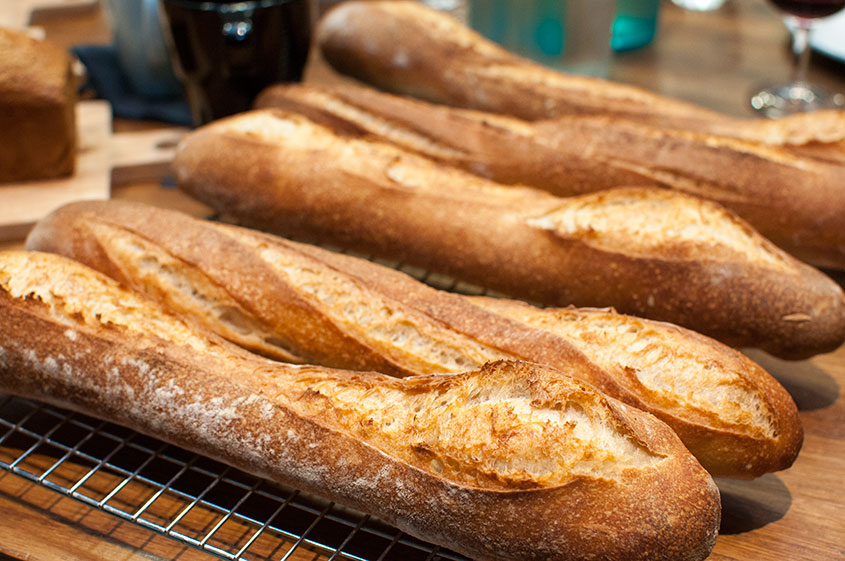
A Little Bite of French History: Chapter 1 – The “Origin Baguettes”
The French, according to Wikipedia, eat 30 millions baguettes per day, we are 60 millions in France.
This said, we have to admit that the baguette is the biggest Food symbol of France.
A baguette is a very simple bread. Like all bread, you need flour, water, salt, and yeast or a starter or a poolish or a mix of 2 of the 3 (poolish + starter for example). While finding the perfect baguette wherever you live may or may not be a challenge. If you decided you wanted to make baguette, you need 3 days. That’s right, a true baguette is not made in a day. But don’t worry, you do need not much time each day. Yes, in Paris, you can learn to make baguette in just 3 hours and you will make wonderful baguettes, but in reality, that dough has to have had the time to work its magic before you bake it.
You may be asking what is so special about the baguette and where did it come from. I mean, there are so many foods we associate with France and French cuisine that are not necessarily original to France. What about the baguette? What are the origins of Baguette? If I told you that we don’t really know, will you stop reading? Please don’t! Truth be told, we don’t really know for sure but, of course, we have some ideas, be they inventive or just wishful thinking.
The Invention of the French Baguette:
1) The craziest: But might very well also be the true origin of Baguette
At the end of the 19th century, around 1898, Mr. Fulgence Bienvenüe was the lead engineer of the construction of the Metro (subway) in Paris. In the galleries, all the workers, from different origins, were expected to bring their own lunch, which often was bread. The bread was big and tough and needed a knife to be cut. Having knives in a dark gallery with people who are not especially peaceful was a “messy”.
Fulgence Bienvenüe seeing this as risky business ordered the bakers to make bread that could be torn apart by hands and forbade knives in the galleries. To this came the response of the bakers, a bread that was easily torn apart by hand and thus easy to consume even by the most thuggish amongst us.
2) The oldest and most believed story :
Napoleon I, yes him again, is said to be the forward thinking man behind the origin of the baguette. (Next time I’ll be sure to tell you about some of what Napoleon has brought to the world of food, and it is a lot).
Napoleon I, around 1805, wanted his baker to make bread that was easy to carry for his soldiers during the long (peaceful) walks through Europe. The bakers came back with a sword or rod-shaped bread. As you are trying to imagine where the soldiers may have carried these phallic symbols, let me steer you in the right direction The baguette was attached to the jacket on the back and not, as we often hear, kept in their pants or in the sheath next to the sabre!

3) The most probable origin of the baguette
In 1839, an Austrian baker name August Zang, founded the ”Boulangerie Viennoise” in Paris. He brought from Vienna a long oval shaped bread that took less time to raise and cook. This bread became more popular in the 1920s when a new law ordered the bakers to NOT start baking before 4am. This decree may have given more peace to the neighbors but it was not enough time to prepare and bake the traditional round big bread named la Miche.
A few baguette facts & tips
The baguette’s size and ingredients are highly regulated:
Size DOES matter:
Large 5 cm, high 4 cm, long 65 cm, weight 250 gram
The price of bread has been under regulation by the government since the French Revolution. Remember how some people lost their heads for saying things like ” si le pain est trop cher qu’il mange de la brioche” (If the bread is too expensive let them eat cake) – Marie Antoinette…
For the geeks:
The flour used for baguette is normally T65 so 12.8 grams of proteins. More proteins = more elasticity, perfect for making baguette. The downside is more proteins also means that the bread dries faster. So a baguette is perfect for a maximum of 12 to 18 hours after it has been baked.
You CAN make that great baguette last:
If you manage to not gobble up your baguette between the time you’ve bought it and you reach your front door (ah hmm! You know who you are), here’s a tip for keeping those baguettes for longer: Freeze your baguette fresh, wrapped in aluminum foil, then reheat frozen in hot oven after passing it quickly under water to rehydrate the bread. Voilà! There you have it, not only can you sound smart at your next dinner party with your choice of the invention of the baguette, but you can also enjoy your perfect baguette longer.
You can pick up fantastic bread-making tips and master the art of bread baking in a half-day French bread class in Paris.


